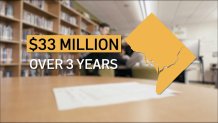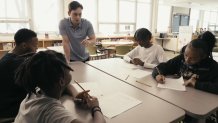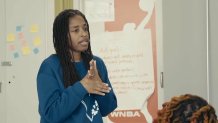To help millions of students affected by pandemic learning loss, many school districts across the country turned to intensive in-school tutoring.
But the News4 I-Team found that, despite widespread agreement among educational experts that tutoring is working, there are real fears those programs could sunset as the federal dollars that fund them are poised to go away later this year.
“For us, tutoring isn't just about remediation; it's also about acceleration,” said Latisha Coleman, principal of Johnson Middle School in Southeast D.C. “It's about giving our kids a leg up.”

We're making it easier for you to find stories that matter with our new newsletter — The 4Front. Sign up here and get news that is important for you to your inbox.
The District has allocated $33 million across three years to fund tutoring services in schools like hers, which largely serves low-income students who otherwise can’t afford private tutoring services. Coleman said it’s been a game-changer in helping her students catch up in reading and math.
She said that, at the beginning of the year, 60% of her sixth graders were behind two or more grade levels in reading. But since tutoring began during school days and on Saturdays, she says that number has dropped to 40%.
“Tutoring has helped build our kids' confidence,” Coleman said. “Especially in math. Because if you ask a kid, especially a Black kid, if you're a math person, so many of them say no, but our kids will say yes.”
Local
Washington, D.C., Maryland and Virginia local news, events and information
Experts interviewed by the I-Team said high-impact tutoring typically occurs during school hours and in small group settings at least twice a week. And whether it takes place virtually or online, experts say having the same instructor is key to its success.
“They help you in ways you never thought you can get help … like, not just, like, educationally. They help you with a lot of other things,” said Johnson Middle sixth grader Zaniyah Hearne.
Johnson eighth grader Christopha Alston said that, while he is sometimes distracted in larger classrooms, the small group math tutoring he receives has helped him focus. Now, he’s confident in skills including long division.
“I’m good at that now,” he said.
Seventh grader Nijel Hubbard added: “It helps you learn that math is really fun and makes you want to come to school even more.”
The students said it’s also helped them help other students who are struggling with math.
“It makes me feel good,” said Jayden Johnson, a seventh grader. “I feel like if I'm going to make it; I want them to make it as well.”
The students aren't the only ones excited about the program. Johnson math teacher Tayler Bryant saw her students struggle during the pandemic. But now, as she also serves as a tutor, Bryant has seen how some students have blossomed in that smaller setting.
“Students are more motivated. They're building their confidence. They are more willing to even help other students,” she said.

Josh Weisbard, another math teacher at Johnson who's also a tutor, said he doesn’t see a future without both classroom instruction and high-impact tutoring.
“You can't really have one without the other," he said. "I think it's just doing so much to help out.”
But that's exactly what might happen as federal dollars that helped to fund these programs are expected to end later this year, unless the states that haven’t spent all of those dollars file for an extension. Some states have also kicked in their own money, but there are fears that won’t be enough.
“It would just be like a tragic heartbreak, I think, if these programs just ended because of all of the impact that they're having,” said Liz Cohen with the Georgetown University education think tank FutureEd.
Cohen has studied varying models of high-impact tutoring that were made possible through federal pandemic dollars.
In one low-income school Cohen studied in Louisiana, every first grader who participated reached their literacy goals for the first time, she said.
Cohen also noted these programs have shown promise when it comes to battling chronic absenteeism. Preliminary findings from a recent study by the National Student Support Accelerator at Stanford University show a nearly 7% decrease in absenteeism among D.C. students receiving tutoring.
“It's transformational, because kids are getting sometimes three, six months, even a year's worth of learning in maybe a few months’ time,” Cohen said.
There's not just concern these tutoring programs will go away but also concern about what that would mean for the kids whose families have never been able to afford it on their own.
In D.C., expensive private tutoring centers tend to be in communities with higher incomes, but experts say government-funded programs have meant students on both sides of the river can benefit.
“That makes it more equitable for the students who usually don't see services like this. And so that puts them on par,” said Lindsay Washington, a tutoring coordinator with the nonprofit Raising a Village.
Abimbola Ogundare, who provides tutoring in D.C. schools through George Washington University’s Math Matters program, said she’s hopeful District leaders will find a way to continue funding the services.
“The schools have seen the work that our tutors do and the relationships that our tutors have built with these students and how impactful that has been for the students. It would be very difficult to believe that [after] seeing that, that they would just let it fall to the wayside,” she said.
According to the Office of the State Superintendent of Education, D.C.’s three-year program is on target to help at least 7,000 students with the goal of helping 10,000. According to OSSE, the schools help decide which students would benefit the most from tutoring.
OSSE leaders also said they’re having discussions with schools about funding choices and hope to continue the programs long-term, but acknowledge it’s so far unclear how that will play out.
Virginia Department of Education Superintendent Lisa Coons is trying to solve the same problem.
“We have to have high-impact tutoring for our students,” she told the I-Team.
Last year, the Virginia General Assembly approved $418 million that can be spent on programs like tutoring through 2026, but Coons said she'd like to find a way to make the program a permanent fixture.
“I do think there are some other things that we spend dollars on in education that we need to think about and make sure that our first two priorities are that high-quality teachers are teaching a high-quality lesson every single day. And then, second, making sure that our supports around students are focused on what we know works — and high-impact tutoring works,” Coons said.
A spokesperson with Virginia’s Alexandria City Public Schools told the I-Team the additional state funds will allow it to scale its tutoring programs to reach a larger number of students. It currently is offering tutoring at schools with the greatest risk of accreditation issues and it’s using its division, Title I and American Rescue Plan funds to pay for its tutoring.
In Prince George’s County, Maryland, there are also high-impact tutoring programs in reading and mathematics. According to a spokesperson, one is the Carnegie Learning Program, which costs $1.8 million a year and is paid for with federal pandemic relief dollars. The school system is planning to sustain the program with district funds, saying it has seen significant performance improvements among students who attended at least 60% of the tutoring sessions.
Meanwhile, the U.S. Department of Education says schools that haven't spent all of their federal relief dollars are eligible to file for an extension to spend that money through 2026. According to the spokesperson, none in our area had applied for the extension as of late February, but many — including D.C. — tell us those discussions are in the works.
If the money does go away, researchers like Cohen say there are some options on the table, such as expanding federal work-study programs that allow college students to tutor in public schools, or expanding programs now offered through AmeriCorps.

Principal Coleman said she’s hopeful but concerned about having to make tough budgeting choices, at a time she already knows she’s losing several school positions next year.
“Without [tutoring], how do we give our kids on this side of town a leg up? How do we say we're getting these kids ready for algebra?” she said. “I have to staff the school building. But without the additional funding, how do I staff the afterschool tutoring supports? It's a tough choice.”
She said, pandemic or not, tutoring’s impact is so life changing she wishes she had it throughout her career.
“Most of my career has been in Southeast Washington, D.C., with kids furthest from opportunity,” Coleman said. “To have had this 20 years ago would have been absolutely a game changer for so many students and their families. I know it to be true.”
This story was reported by Tracee Wilkins, produced by Katie Leslie, and shot and edited by Steve Jones. News4 I-Team photographer Jeff Piper contributed to this report.
Sign up for our Breaking newsletter to get the most urgent news stories in your inbox.



